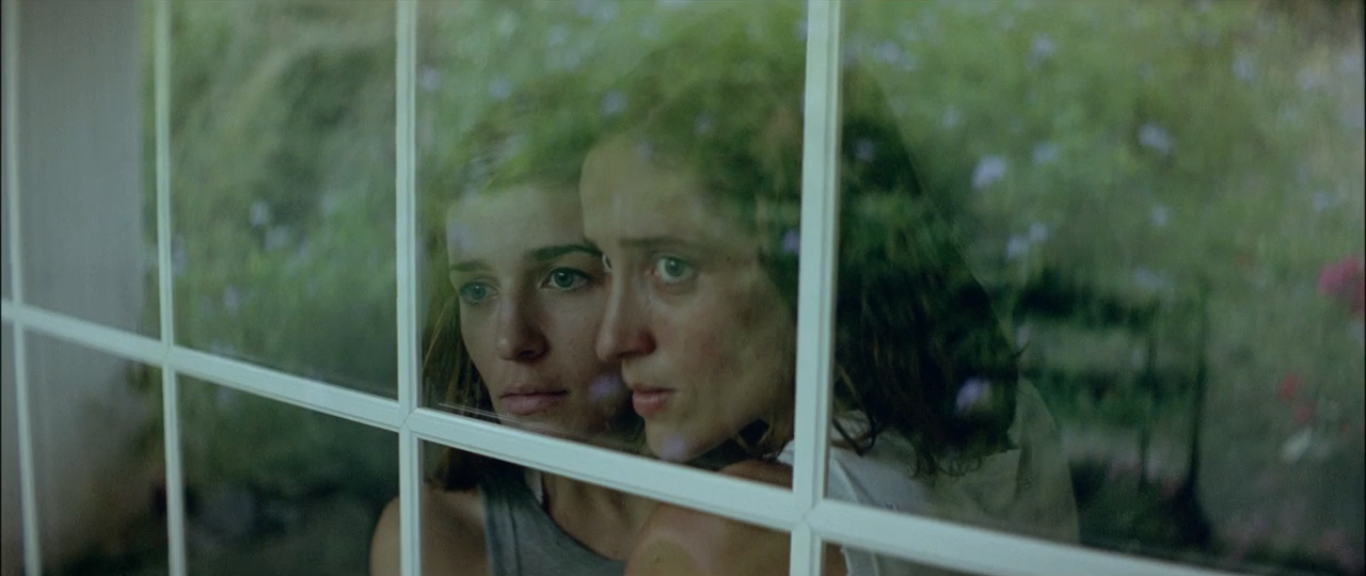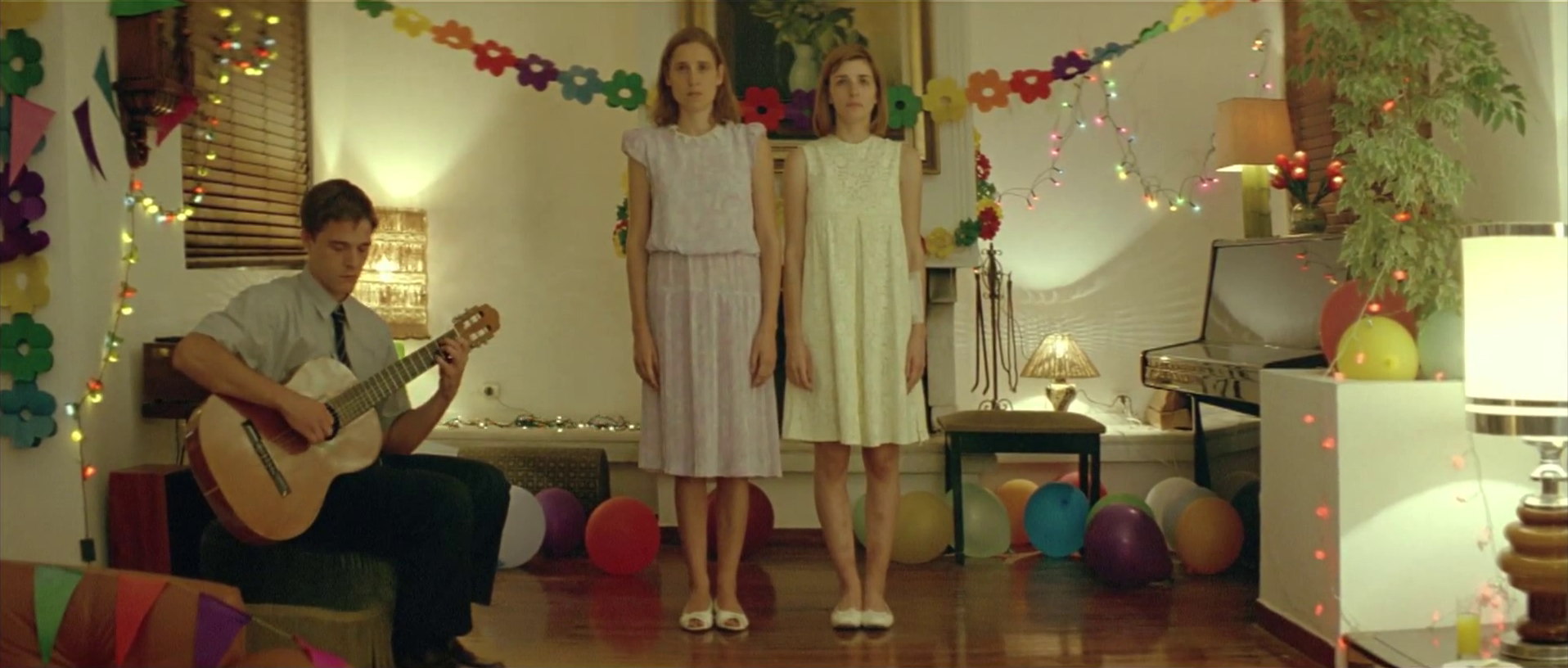Dogtooth and the Power of Language
What does Dogtooth have to do with fascism and George Orwell’s 1984? The manipulation of language...
“The new words of the day are: Sea, Highway, Roadtrip and Shotgun. ‘Sea’ is the leather chair with wooden arm rests like the one in the living room. Example: don’t remain standing, sit down in the sea to have a chat.”
From one angle, it’s a modern garden of Eden: the house is expansive and clean, the garden rambling and lush, with a swimming pool to leap into on a hot summer’s day. Quite quickly, though, it becomes clear that what we’re seeing is a prison: the high walls are designed to keep the children in, not keep intruders out; the parents quietly control every piece of information their offspring see and hear, and punish them brutally for even the smallest infraction.
Besides, the children aren’t really even children at all. At first, we might think they’re teenagers at the most, with their naive way of talking and their juvenile games (“We all put a finger under the water – whoever removes it last is the winner”). Gradually, we come to realize that the younger protagonists in Dogtooth, writer-director Yorgos Lanthimos’ mesmerising 2009 drama, are far older than they appear, and most likely in their 20s – it’s their parents who’ve deliberately kept them in a state of perpetual immaturity.
Winning one of the major prizes at Cannes in 2009 and nominated for an Academy Award the following year, Dogtooth helped bring Lanthimos’ style of filmmaking to a global audience. Here was a film that was weird, graphic and unsettling. Not sensationalistic exactly, but matter-of-fact in its breaking of taboos, and distinctly off-kilter in its approach to filmmaking – it’s hard to think of another movie that’s simultaneously so well shot and so intent on leaving an actor’s head poking out of the top of the frame.
Like Lanthimos’ later films, among them The Lobster and Killing Of A Sacred Deer, Dogtooth doesn’t exactly rush to explain itself to its audience. Some viewers may find it frustratingly vague, even as it’s possible to read all kinds of meanings into it. Why does an otherwise intelligent, well-to-do husband and wife decide to exert such a brutal and damaging influence over their children? Did some collective trauma prompt them to turn their luxurious house into a gated compound, or was it born from misguided conservatism?
Read the latest Den of Geek Special Edition Magazine Here!
The precise meanings of Dogtooth are debatable, but for this writer, the movie’s greatest strengths is its exploration of language: how it can be manipulated and, paradoxically, how it’s both powerful and delicate at the same time.

Dogtooth lays all this out in the first scene. The unnamed kids are forced to learn new words from recordings taped by their parents; bizarrely, though, these recordings are intentionally force-feeding the listener an entirely false vocabulary. The word ‘sea’, the voice says, is another word for chair; ‘highway’ is a strong wind; ‘shotgun’ is a bird.
Gradually, the meaning of these recordings becomes clear: the parents not only want to keep their children away from the real world, by essentially locking them inside a compound, but make them incapable of even communicating with it. Their manipulation of language through their own weird system of education means that, even if the son and two daughters were to sneak out into the world outside, they would have no real means of functioning in wider society.
The lack of modern culture inside the household – movies, books, and music are strictly forbidden – means they would have no real common ground with people their own age. Worse, their misaligned vocabulary would mean that even a regular conversation would be potholed with misunderstandings. In all likelihood, the children would be forced to run back to the safety of their parents – which, of course, is exactly what the parents would want.

Dogtooth economically demonstrates just how much of a child’s view of the world is edited and curated, to a degree, by its parents. A more recent movie like Hereditary shows how a parent’s hang-ups, neuroses and other demons can be handed down to their children, whether they mean them to or not. Dogtooth shows how our perception of reality can be sculpted by our parents, to the point where something as everyday as a passenger jet flying overhead can take on a kind of parallel truth.
More broadly, the Dogtooth household, largely ruled over by the unnamed father (Christos Stergioglou) quickly begins to resemble a miniature fascist state. The language the father and mother (Michelle Valley) teach their children is vaguely reminiscent of Newspeak, the simplified version of English dreamed up by George Orwell in his novel 1984: that is, the state in that dystopia believed that if you control language, then you can control thought. If there’s no word for rebellion, then there can be no rebellion.
Lanthimos may not have consciously intended his claustrophobic family drama to be an allegory for fascism, but it’s striking just how closely the Dogtooth household actually resembles a kind of totalitarian state. In his hugely influential essay Ur-Fascism, Umberto Eco described fascism by breaking it down into a list of 13 common features. These are too numerous and difficult to boil down to repeat here, but again, they’re remarkably applicable to Dogtooth.

Like Hitler’s Germany, the Dogtooth home is a closed state that is founded on ‘traditional’ values – the two daughters are expected to be demure while the son is doted on – and they’re taught that the outside world is dangerous and likely to destroy them. In one jaw-dropping scene, the father manages to convince his offspring that domestic cats are their mortal enemy – a deadly predator that must be avoided at all costs. (“Life,” Eco said of a fascist state, “is permanent warfare.”)
Most relevantly of all, though, Eco’s final point touches on fascism’s tendency to manipulate and winnow down language to control its subjects.
“All the Nazi or Fascist schoolbooks made use of an impoverished vocabulary,” Eco wrote, “and an elementary syntax, in order to limit the instruments for complex and critical reasoning. But we must be ready to identify other kinds of Newspeak, even if they take the apparently innocent form of a popular talk show.”

As with 1984, Dogtooth could be read, therefore, as a warning against fascism and thought control in all its forms. We may not live in a fascist state like Nazi Germany or Mussolini’s Italy, but it’s worth being vigilant for the warning signs that might lead to such a horrifying system. Or, to look at it another way, Dogtooth demonstrates that the worst kind of parenting can begin to resemble a country led by a totalitarian leader.
In either reading, Dogtooth’s conclusion is surprisingly upbeat. Through illicit means, the eldest daughter (Angeliki Papoulia) acquires some Hollywood movies on videotape, and through them, begins to find the language to express herself – and with it, the realisation that she needs to escape the house’s stifling confines. Try as they might, the father and mother can’t stop the real world, with all its slang, colour and temptation, from seeping into the little island they’ve created for their children.
Whether it’s in the state or a household, Lanthimos seems to say, fascism is doomed to fail.